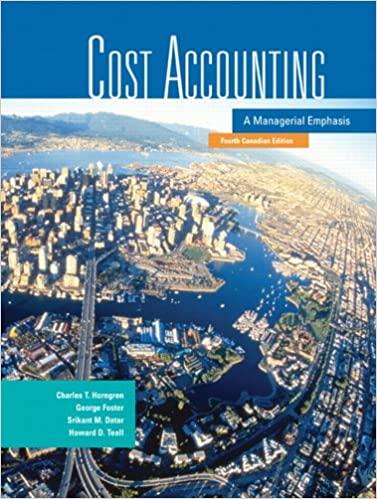Ethics and relevant costs. The Pastel Company must reach a make/buy decision with respect to a high-volume,
Question:
Ethics and relevant costs. The Pastel Company must reach a make/buy decision with respect to a high-volume, easily made metal tool, RG1. Sean Gray, the cost analyst, estimates the following costs and production information for the 50,000 units ofRG1 that are expected to be put into production.
Total direct materials costs $660,000 Direct manufacturing labour costs (all variable) $220,000 Manufacturing overhead costs (all fixed) $440,000 Good units ofRG1 manufactured and sold 40,000 units Units ofRG1 scrapped for zero revenue 10,000 units York Corporation has offered to supply as many units of RG1 as Pastel needs for
$23.10 per unit. If Pastel buys RG1 from York instead of manufacturing it in-house, Pastel would be able to save $263,450 ofthe $440,000 fixed manufacturing overhead costs. (There is no alternative use for the capacity currently used to make RG1.)
Gray shows his analysis to Jim Berry, the controller. Berry does not like what he sees. He asks Gray to review all his assumptions and calculations with the comment, “The yield assump¬
tions you made are very low. I think this plant can achieve much better quality than we have in the past. Better quality will reduce our costs and make them competitive with the outside purchase price.” Gray knows that Berry is very concerned about purchasing RG1 from an out¬
side supplier because it will mean that some of his close friends who work on the RG1 line will be laid off. Berry had played a key role in convincing management to produce RG1 in-house.
Gray rechecks his calculations. He believes it is unlikely that the plant can achieve the quality levels it would take for die make alternative to be superior to the buy alternative.
Required 1. Based on the information Gray obtains, should Pastel make or buy RG1?
2. For what levels ofscrap would the make alternative be preferred to purchasing from outside?
3. Evaluate whetherJim Berry’s suggestion to Gray to review his estimates is unethical. Will it be unethical for Gray to change his analysis to support the make alternative? What steps should Gray take next?
COLLABORATIVE LEARNING PROBLEM
Step by Step Answer:

Cost Accounting A Managerial Emphasis
ISBN: 9780131971905
4th Canadian Edition
Authors: Charles T. Horngren, George Foster, Srikant M. Datar, Howard D. Teall





